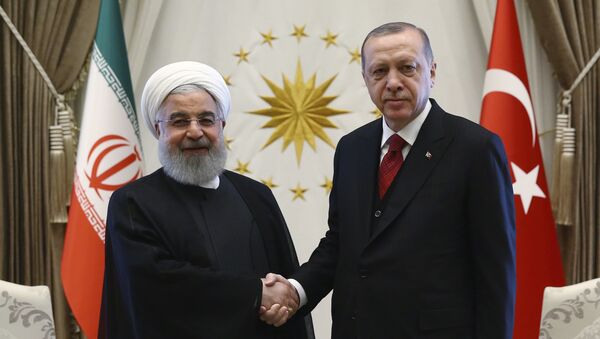Sputnik has spoken with Iran's Ambassador to Turkey Mohammad Farazmand to discuss Washington's anti-Iranian sanctions, their influence on Turkish-Iranian relations, as well as the prospects for the development of the Astana negotiation process on Syria.
Speaking about the position of Turkey regarding the US anti-Iranian sanctions, the ambassador pointed out that "Turkey, as a friendly and independent country, has repeatedly stated that it doesn't accept unjust sanctions against Iran and doesn't want to be part of the sanctions mechanism against a friendly state".
"The illegal sanctions imposed by the United States after its withdrawal from the nuclear agreement affect not only the Iranian people but also all the independent states and nations that wish to have normal commercial relations with Iran. Turkey, which receives a significant portion of its energy needs from Iran, is directly affected by these sanctions. However, we see that Ankara is making every effort to get rid of these illegal sanctions on energy trading with Iran". Mr Farazmand told Sputnik.
Mohammad Farazmand also pointed out that in June, during Turkish Foreign Minister Mevlut Cavusoglu's visit to Iran, the parties signed a memorandum stating that Iranian-Turkish cooperation would continue to develop without being influenced by third countries.
"Mr Cavusoglu's visit to Isfahan is a continuation of diplomatic visits and contacts between the two countries. During the visit, the parties signed a memorandum of understanding, as well a plan to ensure contacts and cooperation between the foreign ministers of the two countries. The document provides for cooperation programmes between Iran and Turkey to be carried out in accordance with the determined schedule and plans, without any influence from third countries", the ambassador said.
‘If US decides to sanction #China for buying #Iran’s oil it would impact them as well’, scholar says (Op-ed) https://t.co/pBKnE0eGci pic.twitter.com/utNz0nTF6U
— Sputnik (@SputnikInt) July 16, 2019
Mr Farazmand stressed that in 2017, Iran accounted for 44 percent of Turkish oil imports, with an average of 1 million [tonnes] imported monthly.
"Iran and Turkey are continuing to protect the interests of the peoples of the two countries as well as to minimise losses from sanctions. Of course, the private sector, particularly in the energy and banking industries, is forced to be extremely cautious faced with American pressure. However, it’s important that, while protecting the citizens' interests, states try to ensure that the private sector suffers minimal damage, not wanting to become blind executors of unilateral sanctions [imposed] by global players".
When asked what Iran expects from Turkey as a partner in the Astana negotiation process, Farazmand said that "Iran, Turkey and Russia, being partners in the Astana negotiation process, have achieved significant success in reducing tension in various parts of Syria. Astana is a successful example of a multilateral approach to solving problems in a crisis region. The three countries are continuing to cooperate in order to end the conflict in Syria as well as to start the political process of solving the crisis. The next trilateral Astana summit will be held in Istanbul".
"We have close political, economic, social and cultural relations with Turkey. These relations have strong support not only at the official level but also at the public and social levels. We see no obstacles to the development of bilateral relations in all spheres", the ambassador concluded, recalling that Iran and Turkey have historically had very close relations.

